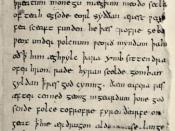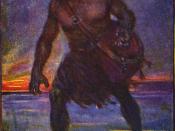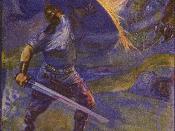Beowulf was written in England sometime in the 8th century. This provides us with an idea that the poem that was written during a time when the society was in the process of converting from paganism to Christianity. When cultures are converting to a new lifestyle, such as Christianity, there are always people who resist the change. This causes the culture to never fully abandon their former faith. The Anglo-Saxons were no different. The Christian influences were combined with early folklore and heroic legends of German tribes. We now try to look at whether or not Christian and biblical influences were added later to originally pagan poem or not. The fact that Christianity and Paganism are so closely intertwined in the poem is the reason Beowulf has both Christian and pagan influences.
The pagan elements in the epic poem Beowulf are evident in the characters Epic-hero personifications. Beowulf is depicted as a superhero.
Not only does Beowulf take it upon himself to save the Danes from Grendel, for his battle with Grendel he decides to "forgo the sword"; he relies on his intense warrior skills and the help of the "wise God, Holy Lord". During the fight, Beowulf's strength takes over, and Beowulf wrestles with Grendel until he is able to rip one of the monster's arms out of its socket. Extreme feats also emerge in the battle with Grendel's mother. When Beowulf dives into the water, he swims, without the use of oxygen, downward for a nearly day before he sees the bottom. During the battle with Grendel's mother, Beowulf finds that Unferth's sword is useless against the monster. He then proceeds to wrestle this huge monster, underwater because "he trusted in his strength, his mighty hand-grip." He grabs "an old sword made by the giants . . .


